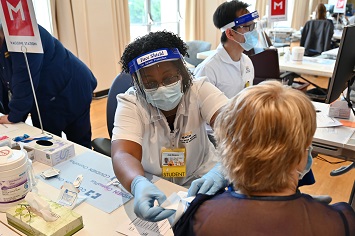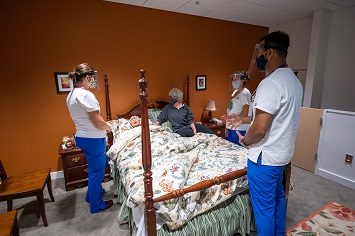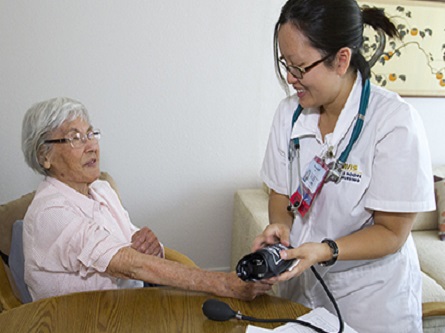By Piri Ackerman-Barger PhD, RN, CNE, FAAN
Preferred Gender Pronouns: She, Her/Hers
Associate Dean for Health Equity, Diversity and Inclusion
Director of Faculty Development for Education and Teaching
Associate Professor, Betty Irene Moore School of Nursing

In the wake of an unprecedented focus on police brutality and racial injustice in the United States we have begun to have necessary conversations about systemic racism. Systemic racism can be thought of as the combination of structural racism (laws, policies, and physical structures), institutional racism (organizational practices) and individual racism (human interactions). Unfortunately, systemic racism is not an issue confined to the legal/carceral system. Data metrics such as health disparities indicate that not only is the healthcare system not equitable but it may be a source of structural violence. Given the disparate outcomes of the COVID-19 pandemic and racial tension in the U.S. there is no better time to discuss health disparities and how to mitigate them.
Although there is no singular approach to addressing a complex problem such as systemic racism in healthcare, we can discuss what the role of the nursing profession is in solving this problem. In a 2019 article, “Perfectly Positioned: Galvanizing Nurses to Address The Social Determinants Of Health,” Dr. Susan Hassmiller highlighted the value and impact nurses, at nearly 4 million strong, can have in promoting health equity. The Robert Wood Johnson Foundation commissioned the highly anticipated Future of Nursing Report 2020-2030, which is a consensus study conducted by the National Academy of Medicine and due for release on May 11, 2021. One of the considerations of the committee is “the role of nurses in improving the health of individuals, families, and communities by addressing social determinants of health and providing effective, efficient, equitable, and accessible care for all across the care continuum, as well as identifying the system facilitators and barriers to achieving this goal” (National Academy of Medicine, 2021).

In fact, nurses are no strangers to health equity advocacy. There is an unsung nursing hero named Susie Walking Bear Yellowtail who was born in 1903 and graduated from Boston City Hospital Nursing School in 1927.She was the first individual of Crow decent to become a registered nurse. Upon graduation she quickly recognized the unmet needs of Native American people and became a public health nurse, traveling the U.S. from 1930’s -1960’s assessing and documenting health disparities and unethical medical atrocities, such as forced sterilization, endured by Native American communities. She was a strong proponent of government reform particularly in Indian Health Services.
Another nursing hero was Mary Eliza Mahoney who was the first African American professional nurse in the United States. Not only did she pave the way for future Black nurses, she was an important advocate for equity in the nursing workforce. “[Mahoney] railed against the ongoing discrimination and inequality in the [nursing] discipline and called for a demonstration at the New England Hospital for the admission of more African-American students” (Boyd, 2015).
These nurses exemplify what Mcnair, Bensimon, and Malcolm-Piqueux (2020) call equity-minded practitioners. They define equity-minded practitioners as individuals who focus on and examine “how racism and a pervasive belief in the hierarchy of human value have shaped our systems, policies, and practices. To ignore how structures were designed is to ignore the necessary process for eliminating inequities” (p.6). Building upon a history of nurses as change-makers and an ethical code that “practices with compassion and respect for the inherent dignity, worth and unique attributes of every person… promotes, advocates for, and protects the rights, health and safety of the patient, [and]… integrates the principles of social justice into nursing and health policy” the nursing profession has the knowledge, skills, and commitment to collaboration with other healthcare providers, patients families, communities and stakeholders, to make sustainable systemic changes to promote health equity.

In its diversity statement the Betty Irene Moore School of Nursing states “We aim to prepare graduates who can inform and participate in improving the health policies needed for health equity to be achieved and for longstanding patterns of inequality to be interrupted. Experiencing and embracing diversity and inclusion enables our graduates to appreciate the innovative leadership required to address these complex issues.” The school also commits to an anti-racist approach and a framework of cultural humility. We therefore strive to teach our students that in their roles as nurses, physician assistants, and healthcare champions they are central to promoting health equity. In addition, by being neutral within a system that produces disparate outcomes they will reproduce those outcomes. Therefore, as nurses and healthcare professionals we must be both equity-minded and active in pursuit of equity.
In honor of National Nurses Day, we should celebrate the many amazing nurses who have contributed to and continue to contribute to the health and wellbeing of patients, families and communities. This is also a time to acknowledge that our work is not done and to re-commit to the ongoing work that is necessary to dismantle systemic racism and health disparities.
Sources
American Nurses Association (2015). The code of ethics for nurses with interpretive statements. Retrieved from https://www.nursingworld.org/practice-policy/nursing-excellence/ethics/code-of-ethics-for-nurses/coe-view-only/
Boyd, H. (30 April 2015). "Mary Eliza Mahoney, the nation's first Black professional nurse". New York Amsterdam News.
Hassmiller, S. (2019). Perfectly positioned: Galvanizing nurses to address the social determinants of health. Health Affairs Blog. Retrieved from: https://www.healthaffairs.org/do/10.1377/hblog20190429.781982/full/.
Mcnair,T,B., Bensimon, E,M. and Malcolm-Piqueux, L. (2020). From equity talk to equity walk: Expanding practition knowledge for racial justice in higher education. Hoboken, NJ: Jossey-Bass. National Academy of Medicine (2021) Retrieved from https://nam.edu/publications/the-future-of-nursing-2020-2030/.
Women’s History Matters (2014). Susie Walking Bear Yellowtail: “Our Bright Morning Star”. Retrieved from http://montanawomenshistory.org/susie-walking-bear-yellowtail-our-bright-morning-star/.
More in celebration of National Nurses Week
Congratulations Aron King, RN, M.S., on recent publication of The Diaries of a Resilient Black Nurse
LinkedIn highlight
Fox 40 Highlights UC Davis Health in Healthy Minute





